Ryobi is a company licensed by Techtonic Industries specialized in the production of household equipment such as pressure washers, chain saws, trimmers, portable generators, and others. The company was founded in 1943 in Japan, and it has become one of the most high-rated brands in the power washing industry.
Ryobi manufactures both electric and gas pressure washers that are unique due to their ergonomic design and safety features. The best Ryobi power washers have advantages and disadvantages that are presented in the Ryobi pressure washer reviews.
Details about the brand, such as history, customer service availability, and warranty policies are discussed in this Ryobi pressure washer buying guide.
The best Ryobi pressure washers are listed below:
- Ryobi RY141900
- Ryobi 1600 PSI
- Ryobi 2300 PSI
- Ryobi 1500 PSI
- Ryobi 2800 PSI
Best Ryobi Pressure Washers Comparison Chart
| PRODUCT | DETAILS | ||
|---|---|---|---|
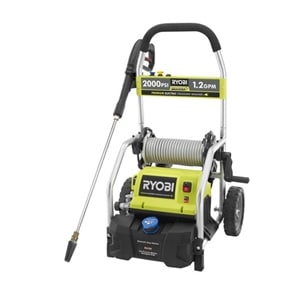 | Ryobi RY141900 |
| View On Amazon |
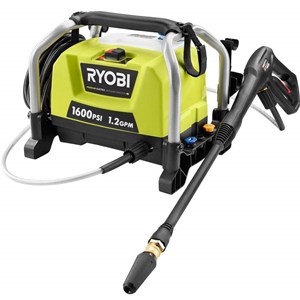 | Ryobi 1600 PSI |
| View On Amazon |
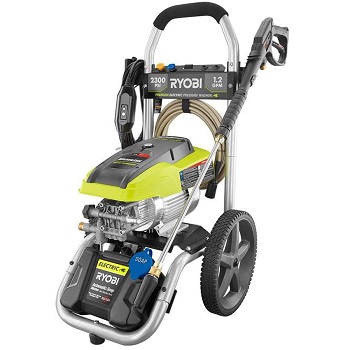 | Ryobi 2300 PSI |
| View On Amazon |
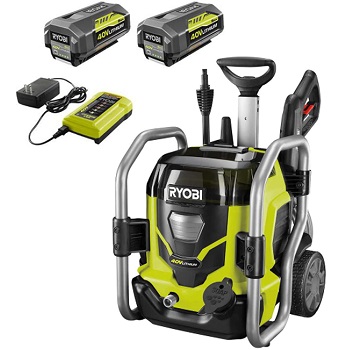 | Ryobi 1500 PSI |
| View On Amazon |
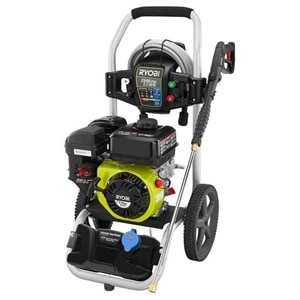 | Ryobi 2800 PSI |
|
Best Ryobi Pressure Washer Reviews (Updated List)
1. Ryobi RY141900

The Ryobi RY141900 is a reliable pressure washer designed for light to medium-duty residential cleaning jobs. This power washer can easily remove dirt, mildew, grime, mold, moss, and other stubborn stains. This machine does a great job cleaning surfaces such as wood, glass, marble, concrete, driveways, cars, garden furniture, grills, and more.
The Ryobi RY141900 stands out among its competitors because it is really easy to use and has a hand truck simplistic design. This pressure washer has a steel-tubing frame that encapsulates the engine and the pump, which are protected by a sturdy case. The weight of the unit is on the lower level of the frame, which increases stability. This power washer weighs 32 pounds, has a simple ON/OFF start system, and can be carried around easily because of the two 7-inch wheels attached to the frame.
The Ryobi RY141900 costs between $120-$150.
The Ryobi RY141900 power washer is powered by a 13-Amp reliable engine that provides a maximum water flow rate of 1.2 GMP and 2000 PSI, totaling 2400 CU. This universal engine is accompanied by a lightweight axial pump made of aluminum.
The accessories of the Ryobi RY141900 are a spray gun, a wand, a tool kit, 3 nozzle tips, a 35-feet power cord, and a 25-feet high-pressure hose.
The Ryobi RY141900 pressure washer is backed by a 3-year limited warranty.
The advantages of the Ryobi RY141900 power washer are as follows:
- The Ryobi RY141900 has an onboard 1-gallon soap tank.
- The Ryobi RY141900 features an automatic 20:1 ratio dilution mechanism.
- The Ryobi RY141900 has an onboard hose reel that expands the lifespan of the hose and reduces storage space.
- The Ryobi RY141900 comes with a trigger lock mechanism that eliminates accidental operation.
- The Ryobi RY141900 has onboard storage for the accessories.
The disadvantages of the Ryobi RY141900 power washer are as follows:
- The Ryobi RY141900 doesn’t perform well on stubborn stains that are not easy to reach, so it has to be operated from a close distance.
- The Ryobi RY141900 lacks pressure control settings.
Read More: Ryobi RY141900
2. Ryobi 1600 PSI

The Ryobi 1600 PSI RY1419MT is a reliable electric pressure washer that comes with relatively low power but is ideal for residential light-duty cleaning jobs that involve paintless rough surfaces.
The Ryobi 1600 PSI RY1419MT’s core strength is its basic compact suitcase design that offers high mobility levels. This pressure washer measures L20.5 x W12.4 x H12.6 inches and weighs 21 pounds. The frame of the unit features a telescopic handle that makes this power washer easy to carry around and provides effortless storage. The casing of this cleaning unit is made of plastic and the frame is equipped with 2 never-flat tires that facilitate transportation even more.
The Ryobi 1600 PSI RY1419MT pressure washer costs around $120-$150.
The Ryobi 1600 PSI RY1419MT power washer is equipped with a 12-Amp engine that provides 1900 PSI and a 1.2 GPM maximum water flow rate, resulting in a total of 2280 CU. The 35-feet electric cord has a GFCI that protects against deterioration due to ground fault currents.
The Ryobi 1600 PSI RY1419MT package comes with the following accessories: a spray trigger gun, a spray wand, a 25-feet high-pressure hose, and 3 nozzle tips. The nozzle tips included in the package are a turbo nozzle, suited for concrete, bricks, and masonry, a 15-degree nozzle, and a soap nozzle.
The warranty of the Ryobi 1600 PSI RY1419MT power washer provides 3-year limited coverage.
The advantages of the Ryobi 1600 PSI RY1419MT pressure washer are as follows:
- The Ryobi 1600 PSI RY1419MT comes with a trigger lock feature that prevents unintentional operation.
- The Ryobi 1600 PSI RY1419MT has an onboard soap tank that comes with a 20:1 soap dilution ratio.
- The Ryobi 1600 PSI RY1419MT is lightweight due to the plastic materials used for the frame.
- The Ryobi 1600 PSI RY1419MT’s accessories can be stored onboard.
- The Ryobi 1600 PSI RY1419MT is supplied with straps for storing the hose.
The disadvantages of the Ryobi 1600 PSI RY1419MT are as follows:
- The Ryobi 1600 PSI RY1419MT doesn’t have a total stop system.
- The Ryobi 1600 PSI RY1419MT package includes only 2 nozzles, which means that further investment is required for versatile cleaning.
3. Ryobi 2300 PSI
 The Ryobi 2300 PSI RY142300 is a reliable electric pressure washer suited for light to medium-duty residential cleaning tasks. This unit is ideal for removing dirt from outdoor furniture, decks, pathways, patios, windows, driveways, and more.
The Ryobi 2300 PSI RY142300 is a reliable electric pressure washer suited for light to medium-duty residential cleaning tasks. This unit is ideal for removing dirt from outdoor furniture, decks, pathways, patios, windows, driveways, and more.
The Ryobi 2300 PSI RY142300 is remarkable due to its high-performance motor. This pressure washer is powered by a 13-Amp brushless induction engine that comes with reduced noise levels and more efficient use of fuel. This motor produces less heat because the induction technology eliminates friction. The total power of this unit is 2760 CU, as the engine generates 2300 PSI and a maximum water flow rate of 1.2 GPM.
The Ryobi 2300 PSI RY142300 costs around $300-$330.
The Ryobi 2300 PSI RY142300 comes with high mobility levels due to its design. This power washer weighs 49 pounds and is supplied with a steel tubing frame that is solidly built and durable. Two 12-inch wheels that ease transportability are attached to the frame. The inbuilt frame handle has a padded grip that makes the unit’s use more comfortable.
The Ryobi 2300 PSI RY142300 features an onboard soap tank provided with soap dilution on a 20:1 ratio. This cleaning unit is accompanied by a metal spray wand, a spray gun, 3 nozzles, a 35-feet power cord, and a 25-feet high-pressure hose.
The Ryobi 2300 PSI RY142300 comes with a 3-year limited warranty.
The advantages of the Ryobi 2300 PSI RY142300 pressure washer are as follows:
- The Ryobi 2300 PSI RY142300 has a turbo nozzle included in the package that helps remove difficult stains.
- The Ryobi 2300 PSI RY142300 comes with onboard storage for the accessories.
- The Ryobi 2300 PSI RY142300’s hose is non-marring.
- The Ryobi 2300 PSI RY142300 is equipped with a trigger safety-lock mechanism to reduce the risk of accidental discharge.
- The Ryobi 2300 PSI RY142300 has a GFCI power cord that protects the unit.
The disadvantages of the Ryobi 2300 PSI RY142300 pressure washer are as follows:
- The Ryobi 2300 PSI RY142300 doesn’t come with a total stop system.
- The Ryobi 2300 PSI RY142300 has a low maximum water flow rate.
4. Ryobi 1500 PSI Cordless Electric Pressure Washer
 The Ryobi RY40PW01DG9 cordless electric pressure washer is designed for light-duty cleaning tasks, as it comes with a maximum pressure rate of 1500 PSI at 1.2 GPM. The total power of this cleaning unit is 1800 CU, which makes it ideal for cleaning windows, cars, bikes, outdoor furniture, and more.
The Ryobi RY40PW01DG9 cordless electric pressure washer is designed for light-duty cleaning tasks, as it comes with a maximum pressure rate of 1500 PSI at 1.2 GPM. The total power of this cleaning unit is 1800 CU, which makes it ideal for cleaning windows, cars, bikes, outdoor furniture, and more.
The Ryobi RY40PW01DG9 cordless electric pressure washer stands out among competitors because it is battery-powered, a feature that offers mobility levels similar to gas pressure washers. The difference between this Ryobi unit and gas pressure washers is that it lacks emissions that can harm the environment and also the user. This pressure washer can be used indoors without the risk of intoxication and helps the operator reach spaces that are not normally accessible with a corded power washer.
The Ryobi RY40PW01DG9 cordless electric pressure washer costs around $525.
The Ryobi RY40PW01DG9 cordless electric pressure washer is equipped with 2 batteries. Each Ryobi battery delivers 40 Volts and 5.0 Ah. This pressure washer weighs 32 pounds and has a compact design that makes it really easy to store.
The Ryobi RY40PW01DG9 cordless electric pressure washer is accompanied by a 25-feet high-pressure hose, an external water tank, and 3 pressure washer nozzle tips. These nozzles include a soap tip, a 15-degree tip, and a turbo nozzle.
The Ryobi RY40PW01DG9 cordless electric pressure washer is backed by a 5-year tool limited warranty and a 3-year limited warranty for the batteries.
The advantages of the RY40PW01DG9 Cordless electric pressure washer are as follows:
- The Ryobi RY40PW01DG9 pressure washer’s battery enclosure is water-proof, making the unit’s operation safer.
- The Ryobi RY40PW01DG9 pressure washer can be used in places where there isn’t a water source present, as it features an external water tank that can be filled remotely.
- The Ryobi RY40PW01DG9 pressure washer starts easily and quickly.
- The Ryobi RY40PW01DG9 pressure washer features a turbo nozzle that helps finish cleaning tasks in half the time needed with a standard nozzle tip.
- The Ryobi RY40PW01DG9 pressure washer needs only one battery, but the package includes two, which extends cleaning time without the need to recharge.
The disadvantages of the RY40PW01DG9 Cordless electric pressure washer are as follows:
- The Ryobi RY40PW01DG9 pressure washer is not very powerful.
5. Ryobi 2800 PSI
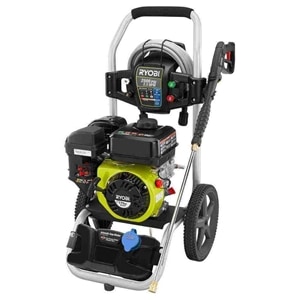
The Ryobi 2800 PSI is a gas-powered pressure washer suited for light and medium-duty residential cleaning jobs. This unit can be used to remove dirt, oil stains, and old paint from metal, stone, concrete, marble, grass, and more.
The Ryobi 2800 PSI stands out among the competition due to its powerful engine. This reliable pressure washer is powered by a GCV160 Honda engine that can deliver 6440 CU. This solid motor generates a pressure of up to 2800 PSI at a maximum water flow rate of 2.3 GPM.
The Ryobi 2800 PSI comes with high levels of portability due to its hand-truck design. This power washer weighs 56 pounds and has a solid frame equipped with two plastic wheels that facilitate portability.
The Ryobi 2800 PSI pressure washer comes with accessories that make it more versatile. These accessories include 3 regular nozzle tips and a soap quick connect nozzle. The gauge nob on the wand can be turned in order to change the pressure, a feature that makes this cleaning unit suitable for removing stains from fragile surfaces.
The warranty of the Ryobi 2800 PSI covers 3 years for the unit, but not for the accessories. Ryobi also offers a 30-day guaranty period.
The advantages of the Ryobi 2800 PSI pressure washer are as follows:
- The Ryobi 2800 PSI provides consistent performance for any type of medium-duty cleaning task.
- The Ryobi 2800 PSI has a compact design that makes it easy to store compared to other gas pressure washers.
- The Ryobi 2800 PSI comes with a built-in control regulator.
- The Ryobi 2800 PSI is equipped with a 25-feet high-pressure hose that can be stored on an onboard hook.
The disadvantages of the Ryobi 2800 PSI pressure washer are as follows:
- The Ryobi 2800 PSI is heavier than an electric power washer.
- The Ryobi 2800 PSI pressure washer’s wheels are made of plastic.
Read More: Ryobi 2800 PSI
*Note: Ryobi 1900 psi pressure washer review is in progress.
How to Use Ryobi Pressure Washer?
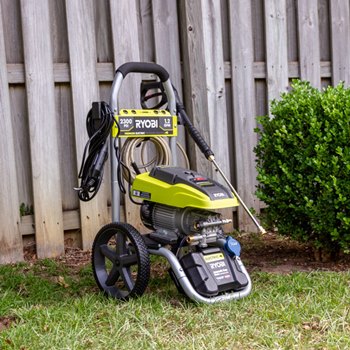 Operating a Ryobi pressure washer is done correctly by taking the following steps in this order:
Operating a Ryobi pressure washer is done correctly by taking the following steps in this order:
Step 1. Connect the Ryobi pressure washer to a water source using a garden hose. The garden hose needs to be attached to the water inlet of the power washer after making sure that the screen is unclogged.
Step 2. Connect the high-pressure hose to the Ryobi pressure washer water outlet. Secure the fitting to avoid leaks. The high-pressure hose needs to be inspected, straightened, and fully unreaped before every operation, keeping it away from heat, or sharp surfaces. Avoid dragging the power washer by pulling the high-pressure hose and try to prevent the hose from wrapping around objects while in use.
Step 3. If the Ryobi pressure washer that is being perated is a gas unit, check the fuel and oil before turning it on to avoid damaging the pump and the engine. If the engine needs more fuel, make sure to refill the tank safely. This step requires keeping away from fire sources, not smoking while performing the procedure, and handling the operation outdoors. The vapors from the fuel are inflammable and toxic.
Step 4. After relieving the pressure from the Ryobi power washer’s gun by pressing the trigger while turning on the water source, start the pressure washer as detailed in the FAQs section of this article.
Step 5. While performing a cleaning task with a Ryobi pressure washer, make sure to hold the trigger gun with both hands to maximize stability. Not holding the gun with both hands could lead to severe injury due to a lack of control. The pressure washer gun might move when pressing the trigger as a reaction to the internal pressure.
Step 6. To stop the water flow from running through the power washer nozzle tip, the trigger of the gun needs to be released.
Step 7. The safety lock out mechanism of the Ryobi pressure washer can be engaged by pushing it up into the slot until a click is heard. This mechanism can be disengaged by pushing it down into its initial position.
Step 8. Attach a nozzle tip to the Ryobi pressure washer as indicated in the FAQs section.
Step 9. Add pressure washer soap to the Ryobi power washer’s detergent tank if necessary. This step is optional. Before performing this action, turn off the power washer and replace the nozzle with the black/soap nozzle. Detach the cap of the soap tank and pour the cleaning solution. After pressing the trigger, wait for a few seconds until the soapy water jet appears.
Step 10. After using a pressure washer cleaning solution with a Ryobi power washer, empty the soap tank and fill it with plain water. Press the trigger of the gun until all the water from the detergent tank comes out. This procedure will remove any soap residue from the unit, which avoids potential damage.
Step 11. Turn off the engine of the Ryobi pressure washer
Step 12. Turn off the water supply.
Step 13. Remove all the water present inside the hoses before storage.
Pro tips for using a Ryobi pressure washer:
- Leave the Ryobi pressure washer to cool down for at least 30 minutes before storing it.
- The use of detergents that are not meant for pressure washer use is not recommended.
- Avoid using a kinked high-pressure hose with a Ryobi power washer, as it could cause injuries to the operator.
- While moving a Ryobi pressure washer, avoid motions that could tilt it sideways or forward.
- While using a gas Ryobi power washer, check for fuel leaks to remove the risk of fire accidents.
About Ryobi
Ryobi Limited is a Japanese company founded in 1943. This brand first started manufacturing die-cast products, and, in time, has expanded its production line to a wide variety of components for automobiles, the telecommunication industry, and electronics. The Ryobi power tools are renowned all over the world for their quality and reliability. Besides the Ryobi tools, this brand also manufactures builders’ hardware and printing equipment.
Ryobi is a brand that focuses on producing pressure washers for DIY cleaning jobs and is constantly improving its technologies and to fulfill most of its customers’ needs. The answer to the question ‘Is Ryobi a good brand?’ is ‘Yes’. The fact that this brand focuses mainly on improving residential cleaning makes its pressure washers highly reliable and versatile.
Ryobi’s mother company is Techtronic Industries, a company that also owns other power tool brands, such as Homelite, Milwaukee, AEG, and others. Ryobi now manufactures tools such as pressure washers, mowers, trimmers, snowblowers, and more.
In 2018, Kyocera acquired a part of the Ryobi power tool line and has continued manufacturing its products while implementing new technologies engineered by Kyocera professionals. This part of Ryobi Power Tools manufactures products different from what the US customers are used to. The pressure washer line sold in the United States is still owned by Techtronic Industries.
Ryobi Nation is an online networking platform where Ryobi customers can share crafting projects, questions, and impressions meant to improve the operators’ experience while using the Ryobi products. This platform hosts a community that offers reliable support for Ryobi owners who have problems with their power tools.
Ryobi Pressure Washers
Ryobi Power Washers’ PSI And GPM Ratings
The Ryobi units’ maximum pressure ratings vary between 1600 PSI – 3600 PSI and their maximum water flow rate is situated on a scale from 1.2 GPM to 2.5 GPM. The most powerful Ryobi pressure washer has a total power of 9000 CU.
Ryobi power washers are suitable for a variety of cleaning tasks that do not require high PSI. These tasks include car, grill, or boat cleaning, requiring 1500 – 1800 PSI, or cleaning patios, decks, or outdoor furniture, tasks that require 2000 – 2300 PSI.
Ryobi Electric Pressure Washers
A Ryobi premium electric pressure washer is not hard to find, as most of the Ryobi electric models rise to high-quality standards. Ryobi currently provides less than 10 electric models. Most of these models have a suitcase design, are lightweight, easy to maneuver, and provide high-performance levels. The great thing about these electric units is that they are relatively small and can be used both indoors and outdoors, which is a plus, especially for home use. The Ryobi corded pressure washers go from 1600 PSI to 2300 PSI and cost between $99 and $300.
Ryobi Cordless Pressure Washers
Ryobi puts a lot of focus on customers’ needs, this is why the engineering of a Ryobi battery pressure washer didn’t take long to arrive. Even though this model is smaller and less powerful than other similar products, it is highly useful because it comes with increased portability levels. The Ryobi RY40PW01DG9 can not be used for prolonged periods without refilling its external water tank but it is highly performant for light-duty cleaning tasks.
Ryobi Gas Pressure Washers
The Ryobi gas pressure washer line is currently composed of a little above 5 models. These units cost between $370 and $740 and are more expensive than a Ryobi electric power washer. The least powerful model in the line can generate a maximum pressure rate of 3000 PSI.
The engines that power the Ryobi gas power washers are mostly manufactured by Honda. The most common engine used by Ryobi is the Honda GC190 which is ideal for residential use. This engine is compact and has an overhead cam design. The fuel consumption of the GC190 is reduced due to its uni-block construction. This model is lightweight and ensures quiet operation because of its internal timing belt.
The Honda GX200 is the most powerful engine used by Ryobi for its gas pressure washers. This model generates up to 3600 PSI, is designed for commercial use, and has a horizontal shaft. The GC200 provides smooth performance, is reliable, fuel-efficient, and exceptionally quiet compared to other engines that provide the same power.
The Ryobi gas power washers provide constant performance even after prolonged use and are easy to store and move around. The designs of these units facilitate stability and maneuverability and also increase comfort during use.
Ryobi Pressure Washer Accessories
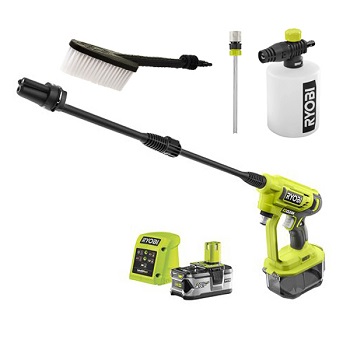 The Ryobi pressure washer attachments are accessories designed to be used with the pressure washers manufactured by Ryobi to enhance the cleaning power of the units. Some of these accessories are universal and fit other brands, depending on the model. The most famous Ryobi power washer attachments are presented below.
The Ryobi pressure washer attachments are accessories designed to be used with the pressure washers manufactured by Ryobi to enhance the cleaning power of the units. Some of these accessories are universal and fit other brands, depending on the model. The most famous Ryobi power washer attachments are presented below.
1. Ryobi Pressure Washer Wand
The Ryobi 308494075 pressure washer spray wand is a replacement part for the Ryobi RY14122 power washer. This wand is durable and lightweight, which makes cleaning more comfortable, as it weighs only 0.44 pounds. The Ryobi RY141600 pressure washer is also compatible with this spray wand that provides reliable performance and measures 17.5 x 1.5 x 1.5 inches.
2. Ryobi Pressure Washer Gun
The Ryobi 3,300 PSI Pressure Washer Trigger Gun Kit is the most famous replacement gun manufactured by this brand. This model is compatible with both electric, as well as gas-powered pressure washers that have a maximum pressure rating of 3300 PSI. The 3300 PSI Ryobi gun is equipped with M22 fittings for both the wand and the hose. The core strength of this pressure washer trigger gun is that it is highly durable and comes with a bayonet adapter.
3. Ryobi Pressure Washer Nozzles
The most renowned Ryobi pressure washer nozzle is the Ryobi 3300 PSI Turbo Nozzle. This nozzle is universal, which means that it can be attached to most electric or gas pressure washers from various brands. The core strength of this power washer nozzle is that it provides a circular spraying pattern and cleans in half time compared to regular nozzles.
4. Ryobi Foam Blaster
Ryobi engineers have designed the Ryobi Foam Blaster to help remove stubborn dirt and clean surfaces that require the use of foamed detergents. These types of surfaces include wood, vinyl, concrete, stucco, fiberglass, stone, tiles, windows, vehicles, and more. This foam cannon can be easily attached to a quick-connect power washer wand and provides the best results while used with specially formulated foam cannon soaps.
5. Ryobi Surface Cleaner
The RYOBI 12 in. 2,300 PSI Electric Pressure Washers Surface Cleaner is meant to facilitate cleaning rough surfaces such as driveways, sidewalks, patios, and more, 4 times faster than with a regular nozzle. This accessory has a maximum pressure rate of 2300 PSI and has a diameter of 12 inches. The advantages of this pressure washer surface cleaner are that it has an ergonomic design that facilitates movement and weighs only 2.35 pounds.
6. Ryobi Undercarriage Cleaner And Water Broom
The Ryobi 11” Water Broom is designed to clean large horizontal surfaces faster than with a regular nozzle. This water broom measures 11 inches and is equipped with 3 rotating nozzles. The package includes only the broom, without the extension wands which can be purchased separately. The advantage of this Ryobi water broom is that it can be used as an undercarriage cleaner, as well.
7. Ryobi Pressure Washer Extension Pole
Ryobi has designed the RYOBI 18 ft. Extension Pole to make cleaning hard-to-reach surfaces easier, eliminating the need for a ladder. This accessory is supplied with an attachable brush designed for deep cleaning. What makes this pole stand out is its length of 18 feet, which is more than similar products from competitors provide. The Ryobi pressure washer extension pole can be used with pressure washers that can generate up to 4200 PSI, electric or gas-powered.
Ryobi Pressure Washers And The Competition
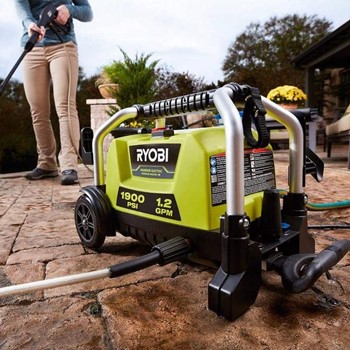 A Ryobi pressure washer comparison can be useful before deciding which cleaning unit is suited for a certain user. As many pressure washers are similar, to have an objective overview of the field, a comparison between Ryobi units and the products of the most renowned companies in the pressure washer industry needs to be considered.
A Ryobi pressure washer comparison can be useful before deciding which cleaning unit is suited for a certain user. As many pressure washers are similar, to have an objective overview of the field, a comparison between Ryobi units and the products of the most renowned companies in the pressure washer industry needs to be considered.
Ryobi vs Karcher Pressure Washers
Ryobi and Karcher are two brands with a long history in the pressure washer industry and both manufacture robust pressure washers that are durable and reliable. The main difference between Ryobi and Karcher pressure washers is that the former ones offer more features and a wider variety of applications than Ryobi models do.
Ryobi focuses on residential cleaning units, while Karcher also offers heavy-duty and industrial cleaning solutions that feature electric or gas-powered engines. Although Karcher is renowned for being the brand that manufactures the most high-rated power washers in terms of quality, Ryobi follows its footsteps and rises to the higher standards of pressure washer consumers.
Ryobi vs Sun Joe Pressure Washers
Sun Joe and Ryobi power washers fulfill similar purposes, as both categories are designed for residential use and have similar power ratings. One main difference between the two brands is that Ryobi features a line of electric units and a line of gas-powered pressure washers, while Sun Joe focuses only on pressure washers with electric motors.
Ryobi doesn’t have a variety of electric models as wide as Sun Joe does but the ones the brand manufactures are on top in terms of quality, reliability, and durability. These models can easily compete with Sun Joe pressure washers. Compared to Ryobi, Sun Joe has a wider variety of features but Ryobi compensates in ergonomics and performance.
Ryobi vs Greenworks Pressure Washers
Ryobi falls in the same price range as Greenworks but its products are a little bit less expensive than Greenworks pressure washers. The difference is that Greenworks is focused on producing only electric units, therefore their components are more varied than Ryobi pressure washer parts.
The Ryobi electric pressure washer models are similar to what Greenworks provides in terms of quality, this is why choosing between the two brands can sometimes be difficult. Greenworks cleaning units have a more extensive selection of features for different user needs but Ryobi is not far back.
Ryobi vs Simpson Pressure Washers
Ryobi manufactures reliable gas pressure washer models but the brand does not offer such a wide variety of units as Simpson does. Simpson pressure washers offer a lot of features and can fulfill various operators’ needs. Most Ryobi gas units are powered by Honda engines, which is similar to what Simpson has to offer, as many of the Simpson power washers also feature Honda engines.
Ryobi gas power washers are ideal for residential use. Ryobi machines are similar in terms of reliability and performance to the Simpson gas pressure washers designed for home use. Ryobi does not manufacture heavy-duty cleaning machines with pressure ratings higher than 3600. Simpson, on the other hand, has an entire line designed for commercial use that is more powerful.
The fact that a company such as Ryobi, which is focused on residential cleaning units, can rise up to one of the world leaders in the gas pressure washer industry took Ryobi in the top 6 power washer manufacturers.
Ryobi Warranty Policy
Ryobi pressure washers are backed by a 3 years limited warranty that covers residential household, family, or personal use. If the unit is used for commercial or rental purposes, the Ryobi warranty covers only 90 days of operation. During these periods, a Ryobi pressure washer will be changed or replaced without charge only if it presents defects in materials or workmanship.
The Ryobi pressure washer warranty does not cover wearable Ryobi pressure washer parts such as spray nozzles, connector fittings, detergent tanks or buckets, spray wand, wheels, trigger handles, connector fittings, or hoses. Ryobi pressure washer air filters, carburetors, spark plugs, and gas filters are also not backed up by this type of warranty.
Ryobi Power Washer Pro Safety Tips
- A Ryobi pressure washer needs to be positioned carefully while in use, as the air coming out of the engine is warm and might leave some discoloration spots on the grass.
- Never use an accessory that is not recommended for a Ryobi power washer, as it could lead to serious injury.
- The use of protective goggles that are ANSI Z87.1 compliant is recommended while using a Ryobi cleaning unit.
- Inspect all the parts of a Ryobi power washer before beginning any cleaning project to reduce the risk of damaging the unit.
- Make sure to turn off the Ryobi pressure washer whenever it is not in use and do not leave it unattended while it still runs.
- Wear long pants while operating a Ryobi power washer and avoid jewelry that can get stuck in the machine.
- Before using a Ryobi cleaning unit, make sure that the cleaned area is free from rocks, nails, strings, or any other objects that can cause injury when they come in contact with high-pressured water.
- Do not use a Ryobi pressure washer when it rains or when the lighting is not good.
- Always read the Ryobi user manual before using the pressure washer for the first time.
- Never use the Ryobi pressure washer barefoot or in sandals.
- While operating a Ryobi power washer, try to hold the trigger gun with both hands for enhanced stability.
- Always wait until the Ryobi pressure washer’s motor fully cools down before storing it.
- Do not direct a Ryobi pressure washer gun towards other persons or animals as it can cause serious injuries.
- Ryobi pressure washer nuts and bolts should be checked before using the unit to prevent motor damage.
- Try to always connect a Ryobi power washer to a separate power circuit in order to expand its lifespan.
Ryobi Pressure Washer FAQs
1. How to start my Ryobi electric pressure washer?
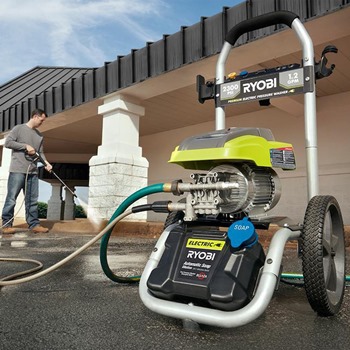 Starting a Ryobi electric pressure washer safely requires the operator to take the following steps:
Starting a Ryobi electric pressure washer safely requires the operator to take the following steps:
- Before turning on the Ryobi pressure washer motor, make sure that the garden hose is connected and that there aren’t any clogs or water intake restrictions.
- The air inside the Ryobi pressure washer hose needs to be released by pulling the trigger and waiting until there is a steady water flow.
- Connect the Ryobi power washer to an electric outlet by making sure that the power switch is set ‘Off’. After connecting the unit, push the reset button to ensure that the power washer is ready to be used.
- Move the Ryobi pressure washer power switch to ‘On’.
- The trigger gun of the Ryobi power washer should be positioned to the area that needs to be cleaned before starting the unit to avoid injury. Always keep a fair distance when the pressure used is really high. When the trigger is released, the water stream will stop.
2. Why won’t my Ryobi pressure washer start?
A Ryobi electric pressure washer will not start for the following reasons:
- The Ryobi pressure washer electric cord is unplugged.
- The Ryobi pressure washer has a tripped GFCI protection system.
- The Ryobi pressure washer still has water pressure inside the hose.
- The Ryobi pressure washer has a tripped house circuit breaker.
- The Ryobi pressure washer’s starting switch is positioned on ‘OFF’.
A Ryobi gas pressure washer will not start for the following reasons:
- The Ryobi pressure washer fuel tank is empty.
- The Ryobi pressure washer’s hose still has water pressure inside that needs to be released.
- The Ryobi pressure washer choke is not in the right position.
- The Ryobi pressure washer‘s ignition is not operational.
- The Ryobi pressure washer has a spark plug that is broken or shortened.
- The Ryobi pressure washer’s ignition lead wire is disconnected from the spark plug or it is shortened or broken.
3. Why is my Ryobi pressure washer pulsing?
If a Ryobi pressure washer is pulsing, it means that there can be a blockage somewhere along the garden hose like kinks that block the water flow from reaching the unit. Also, The water supply could be turned off. A Ryobi pressure washer might not start if the nozzle tip is obstructed by dirt. In this case, the tip should be cleaned using a nozzle cleaner.
4. Where are Ryobi pressure washers made?
Ryobi pressure washers are manufactured in China, as are most of the Ryobi tool models. This doesn’t mean, however, that the units do not provide high-quality. Many manufacturers use the Chinese work market because it is cheaper than having production lines in other countries. Ryobi manufactures some of its accessories in the United States.
5. What oil is best for Ryobi pressure washers?
Gas-powered Ryobi pressure washers require oil with SAE 30 or SAE 10W30. This means that the viscosity of the oil rates 10 during the winter and 30 during the warm season. The rating of this type of oil is generally recommended for most pressure washers. There are models that require SAE 10W20. Before changing the oil make sure to consult the operator’s manual.
6. How to use my Ryobi pressure washer nozzles?
Attaching the right nozzle to a Ryobi pressure washer needs to be done after turning off the unit and disconnecting it from the water supply. The pressure inside the machine needs to be released by pressing the trigger of the gun. The lock-out of the trigger needs to be engaged and pushed up until there is a click. The quick-connect collar needs to be pulled back and the nozzle should be pushed in place in the lance.
Each Ryobi pressure washer nozzle has a purpose and performs different types of cleaning, as follows:
- The 0-degree pressure washer nozzle tip is red and provides the strongest spray pattern of all the regular nozzles. This tip is recommended for tough surfaces that will not deteriorate due to really high pressure.
- The 15-degree pressure washer nozzle tip is yellow and suited for heavy-duty cleaning tasks because it provides a wide spray jet. This nozzle tip is suited for floors and removing stubborn stains from concrete.
- The 25-degree pressure washer nozzle tip is green and is designed for general cleaning tasks, such as patios, outdoor furniture, decks, and more.
- The 40-degree pressure washer nozzle tip is white and recommended for fragile surfaces, such as sidings.
- The 65-degree pressure washer nozzle tip is black and provides the lightest stream of all, this is why it is ideal for applying soaps and detergents, as well as for rinsing.
The turbo nozzle is the most abrasive of all the pressure washer nozzles and is recommended for cleaning masonry, bricks, and concrete.

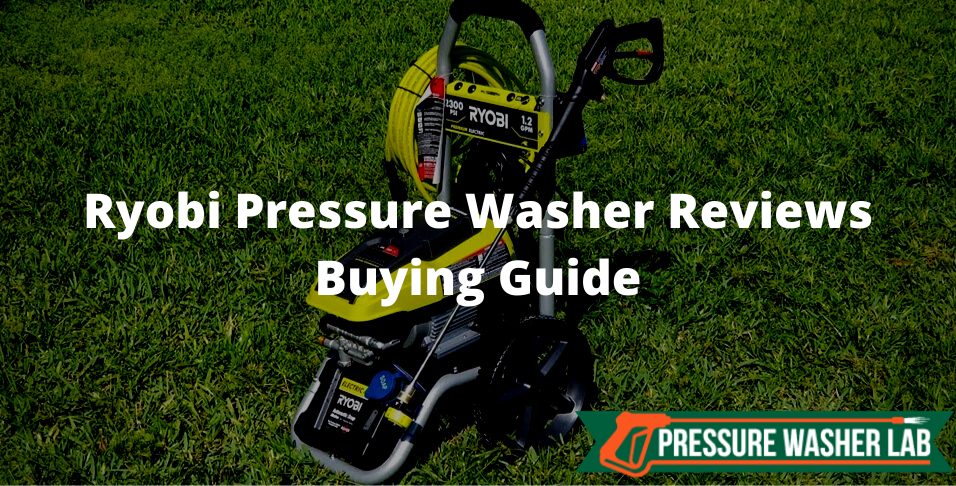
How long will the pump last